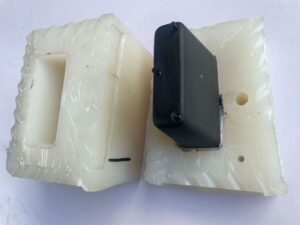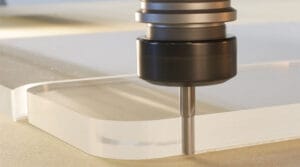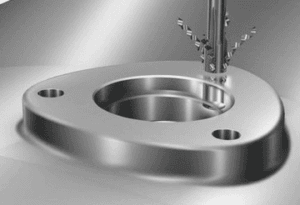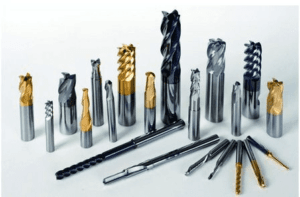
Titanium and aluminum are both well-known for their lightweight properties, making them popular choices for machining. Widely used across various industries, these metals offer exceptional strength-to-weight ratios, excellent corrosion resistance, and versatile manufacturing capabilities.
When selecting materials for a metal product, engineers often face questions like, “Is titanium lighter than aluminum?”, “Is titanium stronger than aluminum?”, or “Which material is better for my specific application?”. To help you make an informed decision, this article provides a comprehensive comparison of titanium and aluminum, checking their key properties and performance in different applications. KUSLA will walk you through the differences between these two metals, ensuring you can select the best option for your project.
Overview of Titanium
Titanium is a silvery-white metal with the Chemical symbol “Ti” and an atomic number 22. It is located in the 4th period and the IV group of the periodic table. it has excellent bio-friendliness and is excellent in aggressive environments where other metals may fail.
Key benefits of Titanium
Before diving into the detailed properties of titanium, let’s first highlight what makes this metal so well-known in the market:
- Lightweight
- High strength-to-density ratio
- Excellent corrosion resistance
- High-temperature resistance
- Non-magnetic, non-toxic
Overview of Aluminum
Aluminum has the chemical symbol “Al” and atomic number is 13, it is a metallic element belonging to the IA group of the periodic table. it is a lightweight material and very easy to be machined, so it is one of the most widely used metal materials in the manufacturing industry.
Key benefits of Aluminum
Like titanium, aluminum also has several well-known advantages. Here are the key benefits that make aluminum a popular choice:
- High Strength-To-Weight Ratio
- Lightweight
- Easy to machine
- Corrosion Resistance
- High thermal conductivity and electrical conductivity
- Low cost
Next, let’s walk through a detailed comparison of these two materials, so you can better understand how they stack up against each other in various key areas.
Titanium vs Aluminum: Property Comparison Chart
First, To give you a clear overview, here’s a comparison chart of the datasheet parameters of titanium and aluminum. This will highlight the key differences between the two materials in terms of their mechanical and physical characteristics:
| Property | Titanium | Aluminum |
| Density | 4500 kg/m³ | 2712 kg/m³ |
| Tensile Strength | 230 – 1400 MPa | 90 – 690 MPa |
| Yield Strength | 240 – 830 MPa | 35 – 400 MPa |
| Ultimate Strength | 550 – 950 MPa | 150 – 570 MPa |
| Modulus of Elasticity | 105 – 120 GPa | 69 GPa |
| Hardness (Brinell) | 230 – 400 HB | 15 – 160 HB |
| Thermal Conductivity | 21.9 W/m·K | 235 W/m·K |
| Electrical Conductivity | 2% IACS | 37% IACS |
| Melting Point | 1,668°C (3,034°F) | 660°C (1,220°F) |
The parameters of both titanium and aluminum can vary depending on the specific grades or alloys used. As a result, the values provided in the chart reflect a range rather than fixed values for each material. To check more detailed datasheets for these two materials, you can visit here: https://www.matweb.com/.
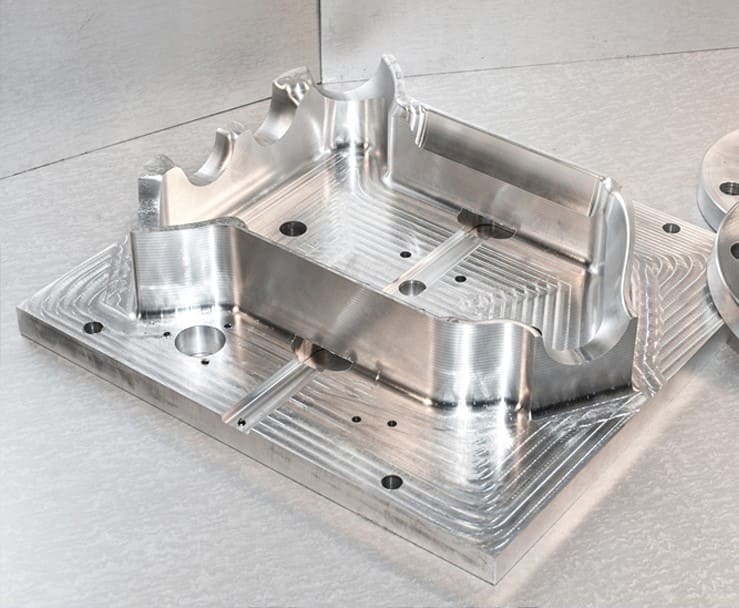
Titanium vs Aluminum: Comparing Key Properties
Let us now take a closer look at some of the key properties of titanium and aluminum, comparing them in more detail to help you understand how each material performs in various applications.
Weight
When compared to other metals, both titanium and aluminum are considered lightweight. However, aluminum has a significantly lower density (2,712 kg/m³) compared to titanium (4,500 kg/m³). This means that, for the same volume, aluminum is much lighter than titanium.
Despite titanium’s higher weight, its strength-to-weight ratio is still excellent, that is why it’s often used in high-performance applications that require both lightweight and strength, such as in aerospace and medical devices.
Strength
Titanium generally offers better strength compared to aluminum. For example, the tensile strength of Titanium alloys varies from 230Mpa to 1400Mpa. while the aluminum alloy’s tensile strength varies from 90 Mpa to 690Mpa. Titanium’s higher tensile strength makes it the better choice for applications that require higher strength.
Generally, titanium alloys are harder than most aluminum alloys, making titanium more scratch-resistant and not deform. However, some aluminum alloys with further improved through heat treatment such as 6082-T6, and 7075-T6 can have higher hardness than titanium.
Melting Point
Titanium has a high melting point (1650 – 1670 ᵒC) while aluminum has a much lower melting point (660.37 ᵒC). This mans that Titanium can maintain stable performance at high temperatures while aluminum may deform at high temperatures.
Thermal Conductivity
In terms of thermal conductivity, aluminum will be better than titanium. because aluminum has high conductivity(210 W/m-K) and is used a lot for applications requiring efficient heat transfer such as heat sinks. Titanium has lower thermal conductivity(17.0 W/m-K) and it is used for applications where heat resistance is not needed.
Electrical Conductivity
Electrical conductivity measures a material’s ability to conduct electricity. Titanium has minimal electrical conductivity around 3.1% conductivity of copper. Aluminum has better electrical conductivity around 64% conductivity of copper. so for applications where electrical conductivity is needed, Aluminum is better.
Corrosion Resistance
Titanium is more corrosion-resistant than Aluminum. Titanium is a non-reactive metal which means it is corrosion-resistant in most environments. Aluminum is corrosion resistant too because of the layer of oxides on the surface of aluminum, but this will depend on the environment.

Titanium vs Aluminum: Fabrication Capability
Both titanium and aluminum are versatile materials, but they have distinct characteristics when it comes to fabrication. Let’s compare their capabilities in key fabrication processes:
CNC Machining
Aluminum is easier and faster to machine than titanium due to its lower hardness and density. In contrast, titanium’s toughness can cause more tool wear, and its higher strength requires slower machining speeds and specialized tooling to prevent overheating and damage to the tools.
Welding
Aluminum is generally easier to weld than titanium. However, due to aluminum’s high thermal conductivity, it can be challenging to control the heat input during welding. This can lead to issues like distortion and cracking if not managed properly. However, titanium welding requires precise control to prevent contamination and requires inert gas protection to avoid oxidation.
3D Printing
Aluminum is easier and more cost-effective to 3D print than titanium. Titanium’s higher melting point makes it more difficult to work with in additive manufacturing, requiring specialized equipment and higher processing temperatures. Aluminum, with its lower melting point, is more commonly used in 3D printing for lighter, high-strength components.
Anodizing
Both aluminum and titanium can be anodized to enhance their corrosion resistance, but titanium offers more limited color options due to the properties of the oxide layer. Aluminum anodizing, on the other hand, provides a wider range of vibrant colors and is easier to perform at a lower cost, making it popular for decorative as well as functional finishes.
Casting
Aluminum is much easier and less expensive to cast compared to titanium. Aluminum alloys have lower melting points, allowing for more efficient and cost-effective casting processes such as die casting and sand casting. Titanium casting is more complex due to its high melting point and the need for a controlled atmosphere to prevent contamination.
Extrusion
Aluminum is commonly extruded into shapes such as tubes, beams, and profiles due to its relatively low strength and ease of forming. Titanium extrusion is possible but requires higher temperatures and more specialized equipment, making it more difficult and costly compared to aluminum.
Bending
Bending aluminum is simpler than bending titanium, as aluminum’s lower strength and higher ductility make it easier to manipulate without cracking. In contrast, titanium’s higher strength requires more force and precise control to avoid distortion during bending.
Titanium vs Aluminum: Applications
These two metals are widely used in production across various industries. By checking their applications, we can better understand the differences and similarities between titanium and aluminum. Below, we explore their key uses in different sectors:
Applications of Titanium
Titanium’s high melting point makes fabrication more challenging and expensive. Despite these challenges, its low thermal expansion, high strength, and excellent corrosion resistance make it highly valued in demanding applications. Here we list some key applications of titanium:
- Aerospace: Used for critical components such as landing gear, hydraulic systems, and firewalls.
- Healthcare: Common in medical devices like dental implants, surgical instruments, and prosthetics.
- Ocean industry: Commonly used in applications such as desalination pipelines, offshore oil drilling pumps, valves, and pipe fittings.

Applications of Aluminum
Aluminum is one of the most widely used metals due to its lightweight, rust resistance, and excellent conductivity. Its ability to form a thin oxide layer makes it naturally resistant to corrosion. Becasue of that, some Key applications of aluminum inlcude:
- Electrical & Thermal Applications: Electrical conductors, generators, motor transformers, and heat sinks (for dissipating heat in electronic devices).
- Automotive: Used extensively in the automotive industry for lightweight components such as vehicle frames, engine parts, wheels, and body panels to improve fuel efficiency and performance.
- Machinery & Equipment: Used in the production of tools, pipes, and various other components for industrial machinery.

Titanium vs Aluminum: How to choose for your Product?
Based on the comparison above, so before you Choose between titanium and aluminum for your project, you need to understand the application requirements and consider the factors below:
The use of your product
Define the key properties requirements for the use of your product such as Corrosion Resistance level, the environment temperature to be used, and so on. Then choose the one that fits your requirements based on the comparison above.
Cost
Aluminum is generally more cheap than titanium, it is a cost-effective choice for low-cost projects when you have a tight budget. meanwhile, titanium is often used in high-end products.
Part Geometry
Check the Geometry of your product, Aluminum is easy to machine and fabricate, it is a good choice for components with complex geometries.
Aesthetic
The choice of material can influence the appearance of your product, including its color and finish. Some parts may require specific colors or finishes for aesthetic purposes. Titanium typically has a silver-grey appearance that darkens under light, giving it a more matte look. In contrast, aluminum has a brighter silvery-white appearance, which can be polished or anodized for various finishes, offering more versatility in achieving different visual effects.
Conclusion
In summary, titanium and aluminum each have unique properties and advantages, suitable for different applications. At KUSLA, we know well about these two materials and we provide CNC machining services both for aluminum and titanium materials for your different project needs. Contact us if you have any questions about how to choose between these two metal materials.
FAQ
How to tell Titanium and Aluminum?
To tell Titanium and Aluminum, you can check the hardness, color, and weight of the parts. Titanium is harder than aluminum, So you can draw against each other to check which one is cut. And, titanium will have a more metallic luster color than aluminum, you can tell from the color. And, at the same size, titanium will be heavier than aluminum.
Which is better, aluminum or titanium?
Usually, It is hard to say which is better. because Titanium is generally harder and aluminum is more machinable. So, the choice will depend on the requirements of the applications.


